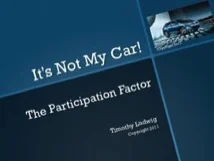Labeling (like calling someone "stupid") is a dysfunctional practice that kills a safety culture. Blame the worker and call out that injuries are their fault … and lose the chance to learn. There is a better way to get at the root causes of behavior.
Read MoreThat “Zero Harm” goal on all the posters may seem insurmountable. In fact, a misunderstanding of behavioral variance can be dysfunctional for your Safety Culture. A more fruitful path is to get to the numbers behind the number… a path to get you Below Zero through employees engaging in a reporting culture. Let’s learn how some companies achieve Below Zero.
Read MoreIf you're a parent then you probably learned safety the hard way as your kids explored their new world. In this fun talk we will discuss why a compliance-based culture should be replaced by a reinforcing culture that facilitates Actively Caring for others.
Read MoreOur safety processes do a good job of finding recognizable hazards and risks but even the trained eye can miss escape paths for injuries. Safety processes should be designed to better consider Latent Hazards and Risks often at the boundaries of established processes where novelty and short cuts may conceal gaps in our safety systems.
Read MoreUnderstanding variance around risk teaches us how to mature your Safety Culture. We learn the role of leaders in building the value of safety and the role of engaged workers willing to use their discretion to effect change.
Read MoreOwnership must be facilitated in any Safety Culture Change. Through stories and real-world examples, we'll take a journey though ownership, self-determination, and discretionary behaviors
Read MoreBehavioral Safety has been used effectively for decades to reduce injury in a multitude of industries all around the world. Behavioral Safety evolved from the findings of Behavioral Science whose research has supported innovations in the field. This presentation will present the science behind behavioral safety as well as how to design, implement and evaluate an employee-based observation and feedback process. Best practices will also be presented.
Read MoreIf checklists are to be effective as behavior-management tools, you must manage the behavior of using checklists! Learn how to increase the Integrity of Procedure Use and Checklists.
Read More







